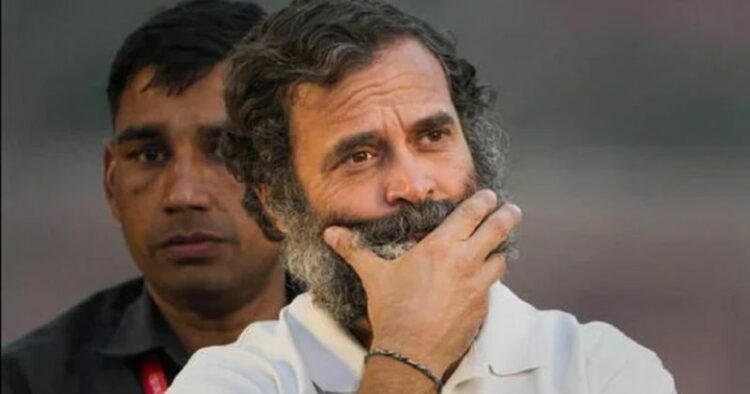Surat, Gujarat: On March 23, a Surat District Court held Congress MP Rahul Gandhi guilty in a 2019 criminal defamation case over his remarks on Prime Minister Narendra Modi’s surname.
BJP MLA Purnesh Modi lodged a complaint against Rahul Gandhi’s remarks on the ‘Modi’ surname wherein he repeatedly asked, “Nirav Modi, Lalit Modi, Narendra Modi. How come they all have Modi as common surname? How come all the thieves have Modi as common surname?” on April 13, 2019, at a rally in Kolar. Furthermore, he added, “The name Modi symbolises the collusion between India’s biggest crony capitalist and the Prime Minister of India”
The name Modi symbolises the collusion between India’s biggest crony capitalist and the Prime Minister of India: @RahulGandhi at #CongressPlenarySession
Watch LIVE: https://t.co/hMlRpgrUU6 pic.twitter.com/rDU1ofeky3
— NDTV (@ndtv) March 18, 2018
Rahul Gandhi pleaded not guilty in front of the Surat court in October 2019. As per the case Rahul was charged under sections 499 (defamation) and 500 (punishment for defamation) of the IPC. However, the Surat District Court sentenced Rahul Gandhi to two years imprisonment u/s 504 (Intentional insult with intent to provoke breach of the peace) of the Indian Penal Code (IPC) for his remarks against the ‘Modi’ surname.’ However, the Court granted Rahul Gandhi bail to appeal his conviction and suspended the sentence for 30 days.
Rahul Gandhi has been convicted u/s 499 and 500 of IPC. The sentence awarded is for 2 years and against that sentence, he has plead that he may be released on bail till appeal period and as per law, the Court has granted him bail for 30 days and until appeal, the sentence is… pic.twitter.com/d8TFyMcUi2
— ANI (@ANI) March 23, 2023
Will Rahul Gandhi lose his Wayanad MP seat?
It is pertinent to note that u/s 8(3) of the Representation of the People Act, 1951, “a person convicted of any offence and sentenced to imprisonment for no less than two years shall be disqualified from the date of such conviction and shall continue to be disqualified for a period of six years since his release.”
It is pertinent to note that on February 13, 2023, Azam Khan’s son and former Samajwadi Party MLA Abdullah Azam Khan lost his MLA seat from Suar, Rampur constituency in the 2008 Chhajlet case after being sentenced to two years imprisonment with an Rs. 3000/- fine. Abdullah Azam Khan’s disqualification from the Uttar Pradesh Legislative Assembly was effected from the date of his conviction.
Abdullah Azam Khan’s fate mimicked his father’s as Azam Khan lost his Rampur seat. Azam Khan’s Rampur seat was declared “vacant” after being convicted in the hate speech case connected to the 2019 Lok Sabha elections.
However, on May 23, 2022, AAP Patiala Rural MLA Dr Balbir Singh, including three others, was sentenced to 3 years of rigorous imprisonment in a 2011 assault case. Thereafter, MLA Dr Balbir Singh appealed to Sessions Court against his conviction.
The Additional Sessions Judge Barinder Singh Ramana observed, “The appellant was elected as member of State Legislature in the general elections which were conducted in February 2022. As per section 8(3) of Representation of the People Act, 1951, provides for the disqualification of the member of the Legislature in case he is convicted and sentenced to imprisonment for more than two years.”
He added, “The special circumstances are attracted in this case as the disqualification of the appellant from the State Legislature would also make the people of his constituency unrepresented. In case the conviction is not stayed and the appellant is disqualified, the fresh elections would be required to be conducted for electing a representative from the assembly constituency represented by the appellant.” Therefore, the Sessions Court stayed MLA Dr Balbir Singh’s conviction
Rahul Gandhi tearing the UPA’s Ordinance
In 2013, the Congress-led UPA Government introduced the Representation of the People (Second Amendment and Validation) Bill, 2013 in an attempt to overturn the Supreme Court’s decision to strike down section 8(4) of the Representation of the People Act, 1951.
Section 8(4) of the Act deferred a sentenced representative’s conviction by 3 months to allow them to appeal before a higher court and prevent disqualification. The UPA Government’s amendment proposed that the convicted representatives would not be disqualified immediately after conviction.
On September 24, 2013, the UPA Government attempted to bring the amendment into effect as an Ordinance before the verdict in Congress ally and RJD supremo Lalu Yadav’s fodder scam case. However, Rahul Gandhi called the Ordinance “complete nonsense that should be torn up and thrown away,” and tore the Ordinance during the press conference. Thereafter, the UPA Government withdrew the Ordinance and the Bill.
In October 2013, Lalu Yadav was disqualified from the Lok Sabha and barred from contesting elections for 11 years which included his 5-year imprisonment and 6-year bar subsequent to his release under the Act.
Former Congress leader Ghulam Nabi Azad’s resignation letter claimed that “Rahul Gandhi demolished the entire consultative mechanism of the Congress after he entered politics, particularly after he was made the party vice president by Sonia Gandhi,” referring to Rahul Gandhi’s tearing the Ordinance during a press conference.


















Comments